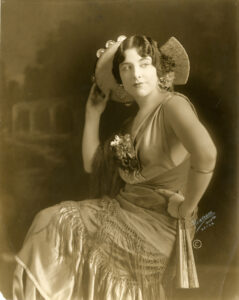Table of Contents
Geraldine Farrar: The Dazzling Diva of Opera and Silent Film
Opera fans and history enthusiasts alike recognize the name Geraldine Farrar, synonymous with both stage charisma and early recording technology. This American soprano was a powerhouse of talent and beauty, captivating audiences in the early 20th century. With her striking good looks and a powerful voice filled with passion, she became a darling of the opera world and, later, a silent film icon.

Geraldine Farrar, born in Melrose, Massachusetts, in 1882, displayed musical talent from a young age. Her family nurtured her gift, and she eventually pursued formal training in Europe. In 1901, her sensational debut as Marguerite in Faust at the Berlin Opera propelled her to stardom. Farrar’s passionate interpretations and vibrant stage presence quickly made her a leading lady, and she became a beloved fixture at New York’s Metropolitan Opera.
Farrar was known for her versatility, but some roles stand out in her repertoire:
- Cio-Cio-San in Madama Butterfly: Farrar brought Puccini’s tragic heroine to life with heart-wrenching intensity.
- The title role in Carmen: Her portrayal of the fiery and seductive Carmen was the stuff of legends.
- Juliette in Roméo et Juliette: Here, her youthful charm and lyrical voice perfectly embodied a young woman caught in an immortal love story.
- The Goosegirl in Königskinder: A lesser-known but significant role, her portrayal of the Goosegirl showcased her ability to bring depth to fairy tale characters.
Beyond her vocal and dramatic abilities, Farrar was a trendsetter. Her flamboyant stage costumes and glamorous off-stage persona inspired a generation of young women. These young fans, captivated by Farrar’s independent spirit and larger-than-life personality, adopted the nickname “Gerry-flappers.” This term, a play on the popular “flapper” style of the 1920s, reflected their admiration for Farrar’s modern outlook. Farrar’s influence extended beyond fashion; her passionate performances resonated with young women who saw her as a role model of strength and artistic freedom.
In the 1910s, Farrar began working with famed director Cecil B. DeMille, starring in several highly successful silent films. Her film career peaked with her 1915 portrayal of Carmen in a screen adaptation of Bizet’s opera. Farrar’s dramatic flair and expressive beauty translated beautifully to the silent screen.
Geraldine Farrar embraced the recording technology of her time, and we can still enjoy a glimpse of her vocal prowess through her 78rpm recordings. Though made with earlier technology, these recordings offer a valuable window into Farrar’s artistry and capture the unique sound of her era.
She recorded for two major record companies of the era: the Victor Talking Machine Company and the Gramophone & Typewriter Company (G&T). Her Victor recordings, made between 1904 and 1914, showcase her interpretations of operatic arias, including those from her signature roles in Madama Butterfly and Carmen. They also feature her renditions of popular songs of the day, like the sentimental ballad “Mighty Lak’ a Rose” and the dramatic narrative song “Danny Deever.”
Farrar’s G&T recordings, made even earlier between 1901 and 1906, are particularly prized by collectors. They capture the youthful vibrancy of her voice at the beginning of her career and include a wider range of operatic selections, along with German lieder and French melodies. Notably, these recordings also feature some duets with the legendary tenor Enrico Caruso, offering a unique opportunity to hear these two operatic titans perform together. Some of her notable recordings include:
- Arias from Madama Butterfly and Carmen
- Songs like “Mighty Lak’ a Rose” and “Danny Deever”
- Duets with the legendary tenor Enrico Caruso
A Timeless Legacy
Geraldine Farrar died in 1967, leaving behind a rich artistic legacy. Her voice, her dramatic flair, and her enduring influence on opera and popular culture still fascinate fans of music and history today. From the stage to the screen to the grooves of early records, she was a true pioneer and an unforgettable star.
Want to learn more?
Websites like Wikipedia and the Internet Archive offer a treasure trove of information and audio samples of Geraldine Farrar’s 78rpm recordings.
Selected Songs
Explore a few of Farrar’s recordings here:
Songs my Mother Taught Me
Madama Butterfly-Un bel di vedremo (Some Day He’ll Come)
